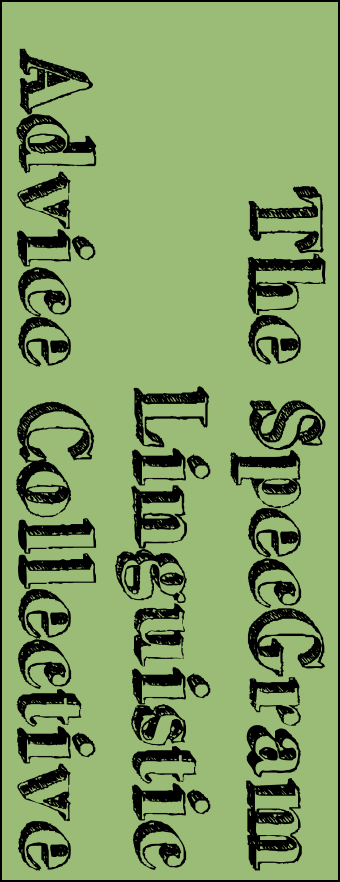


Are you in a world of linguistic hurt? The SpecGram Linguistic Advice Collective (SLAC) will offer you empirical, empathic, emphatic advice you can use!*

Remember, if you can tell the difference between good advice and bad advice, then you don’t need advice! So, if you need advice, trust us
Dear SLAC,
Thanks ever so for the recent advice column on focus. All this while I’ve been pluralising it as feces (pron: [fekes]) on analogy with man~men and ox~oxen. Anyway, as a health conscious diner with an obsession for half-
—Veggie Val
Dear Veg,
As you are no doubt aware, standard practice in English is to derive the plural of loan-
—SLAC Unit #50657465
Dear Veggie Tales,
Couscous is a mass noun, since, if you eat too much of it, you’ll gain mass. Therefore, it doesn’t have a plural. Simples.
Yours gorgingly,
—SLAC Unit #4a6f6e617468616e
Dear Vegetative State,
It is somewhat unclear. Some have argued that as an obvious reduplicative, the plural is cousescouses [kusizkusiz]. As you may know, it is often eaten with several different cheesescheeses and in traditional societies from a wooden plate balanced on one’s kneeseskneeses. Others, however, have argued that as an uncountable noun, couscous has no plural. If you wish to speak of many units of the mass, it’s on analogy with grain(s) of rice and carton(s) of milk. In the case of couscous, the unitising noun is couscousette(s) thus:
A: “I’ll have a platter of 743 coucousettes of couscous, please waiter.”B: “Sorry, madam, we only have one couscousette of couscous left”A: “Come along, Marmaduke; we’re leaving!”
—SLAC Unit #4465616b
Dear Veg-
Most of the better sort of speakers of English will tell you that, as with all such plurals from that general part of the world, the pattern is couscous-
—SLAC Unit #4d696b61656c
Dear Vegetal Virgin,
English is all-
In the meantime, stop it with the antediluvian old-
—SLAC Unit #54726579
Dear Valency Changing Operation,
I must recant my previous hearsay-
Hope that helps!
—SLAC Unit #4465616b
Dear Valued and Valiant Val,
While it is true, as SLAC Unit #4465616b notes in his rather sloppy (hasty?)** and incomplete response to your inquiry, that Rotherburp was the first to record the use of couscous, the first mass use of the word-
I would think we now understand the massive impact of the word. I humbly submit that my extensive knowledge which I bring to this matter need no further modifications. And, of course, I (and my attorneys) kindly request (my attorneys say “require”) that any usage of the above scholarship adequately refer to (and remunerate) me.***
—SLAC Unit #4a6f65
Dear Ritchie Valens,
By law, couscous is its own plural, or technically the plural of cous.
Historically, couscous was the dual form. In general, pluralization was achieved by using the singular form as the base of a unary numeral system. In most cases, this was a workable solution. If you went to the egg shop, you might order eggeggegg, but you weren’t going to eat 184 eggs.
When a Moroccan restaurant invented couscous, the flaw in the system became obvious. Customers rattled off an uncountably large number of couses so quickly that waitstaff had to ask them to slow down and order one cous at a time as they used tiny tongs to carefully serve each individual grain. The food was delicious, and each night the line out the door grew longer. It was inevitable that eventually a fight would break out as the people in the back of the line angrily questioned whether the person at the head really needed that 573rd cous or whether the line could advance. After a particularly bloody fight, the king declared that couscous would refer to a full serving and that anyone ordering a third cous would be exiled to Italy, where the pasta is big.
—SLAC Unit #56696e63656e74
P.S. If you’re going to Morocco to try couscous, I’d recommend taking the ferry.
Dear Valet,
Couscous being, as it were, underfed pasta, the only plural that can make it culinarily worthwhile is noodles.
—SLAC Unit #4b65697468
Dear Val,
SLAC Unit #4b65697468 is coo-
—SLAC Unit #4d61726b
Dear Valyrian,
SLAC Unit #4b65697468’s response about noodles made me realise that noodles are simply undetached starchy parts; the plural is, of course, gavagai.
—SLAC Unit #4a6f6e617468616e
* Advice is not guaranteed to be useful, practical, or even possible. Do not attempt at home. Consult a doctor (of linguistics, philology, or
** It was not an English rugby team, it was the New Zealand All Blacks. Rotherburp’s avian colleague was a macaw, not a parrot. The initial qaf was in Persian, not Arabic.
*** The SpecGram Linguistic Advice Collective’s lawyers would like to remind SLAC Unit #4a6f65 that, since we are a Collective, any usage of the above scholarship should refer to us and any remuneration should be sent to us. SLAC Unit #4a6f65 will receive the same fair share as any contributing member of the Collective of his seniority, which is to say, about 0.0000000000000000000000000001%, ± 0.00000000000000000000000000005%, depending on the weather.
 |
Linguistic Folk Wisdom |
 |
The Journal of Lockdown Linguistics (International Edition) |
 |
SpecGram Vol CLXXXVII, No 3 Contents |